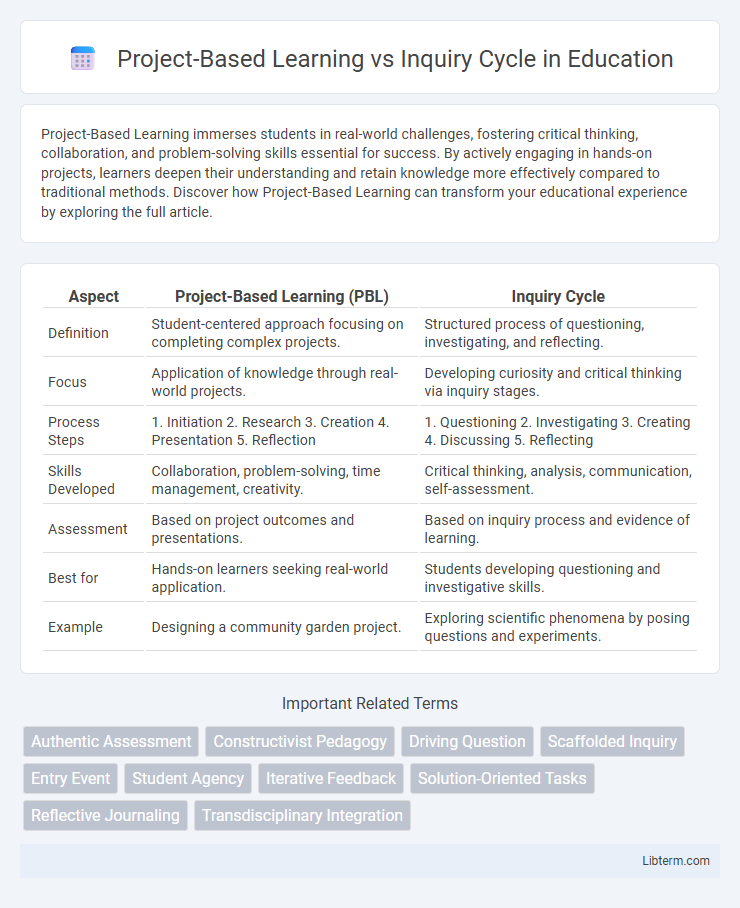Project-Based Learning immerses students in real-world challenges, fostering critical thinking, collaboration, and problem-solving skills essential for success. By actively engaging in hands-on projects, learners deepen their understanding and retain knowledge more effectively compared to traditional methods. Discover how Project-Based Learning can transform your educational experience by exploring the full article.
Table of Comparison
| Aspect | Project-Based Learning (PBL) | Inquiry Cycle |
|---|---|---|
| Definition | Student-centered approach focusing on completing complex projects. | Structured process of questioning, investigating, and reflecting. |
| Focus | Application of knowledge through real-world projects. | Developing curiosity and critical thinking via inquiry stages. |
| Process Steps | 1. Initiation 2. Research 3. Creation 4. Presentation 5. Reflection | 1. Questioning 2. Investigating 3. Creating 4. Discussing 5. Reflecting |
| Skills Developed | Collaboration, problem-solving, time management, creativity. | Critical thinking, analysis, communication, self-assessment. |
| Assessment | Based on project outcomes and presentations. | Based on inquiry process and evidence of learning. |
| Best for | Hands-on learners seeking real-world application. | Students developing questioning and investigative skills. |
| Example | Designing a community garden project. | Exploring scientific phenomena by posing questions and experiments. |
Introduction to Project-Based Learning and Inquiry Cycle
Project-Based Learning (PBL) emphasizes student-driven exploration through real-world projects that foster critical thinking, collaboration, and problem-solving skills. The Inquiry Cycle frames learning as iterative phases--questioning, investigating, analyzing, and reflecting--aimed at deepening understanding through evidence-based inquiry. Both approaches prioritize active engagement but differ in structure, with PBL centering on comprehensive project completion and the Inquiry Cycle focusing on systematic investigative processes.
Core Principles of Project-Based Learning
Project-Based Learning (PBL) centers on student-driven projects that emphasize real-world relevance, collaboration, and iterative problem-solving to foster deeper understanding and skill development. Core principles include sustained inquiry, authenticity of projects, reflection, and public product creation, ensuring meaningful engagement and knowledge application. Unlike the Inquiry Cycle, which focuses on cyclical phases of questioning and investigation, PBL integrates these within a comprehensive, context-rich project framework to enhance critical thinking and creativity.
Core Principles of the Inquiry Cycle
The Inquiry Cycle centers on core principles such as questioning, investigating, reflecting, and applying knowledge, promoting deeper understanding through iterative exploration. This framework emphasizes learner autonomy and critical thinking by guiding students from curiosity-driven questions to evidence-based conclusions. Unlike Project-Based Learning, which culminates in a tangible product, the Inquiry Cycle prioritizes cognitive processes and continuous refinement of ideas.
Key Differences Between Project-Based Learning and Inquiry Cycle
Project-Based Learning centers on students completing a complex project over time to demonstrate their understanding, emphasizing real-world application and collaboration. The Inquiry Cycle focuses on the iterative process of questioning, investigating, and reflecting to build knowledge, highlighting critical thinking and exploration. Key differences lie in Project-Based Learning's product-oriented outcome versus the Inquiry Cycle's process-oriented approach to learning.
Similarities and Overlapping Features
Project-Based Learning and the Inquiry Cycle share a strong emphasis on student-centered exploration and active problem-solving, fostering critical thinking and collaboration. Both approaches involve iterative questioning, research, and reflection phases that encourage learners to construct knowledge through real-world contexts. These methodologies overlap in promoting hands-on engagement and continuous assessment to deepen understanding and skill acquisition.
Benefits of Project-Based Learning
Project-Based Learning enhances critical thinking and problem-solving skills by engaging students in real-world challenges that require active exploration and sustained inquiry. It promotes collaboration, communication, and creativity, fostering deeper understanding and retention of subject matter across disciplines. Students develop practical skills and intrinsic motivation as they navigate complex projects, preparing them for future academic and career success.
Advantages of the Inquiry Cycle Approach
The Inquiry Cycle approach fosters deeper critical thinking and promotes active student engagement by encouraging continuous questioning and exploration throughout the learning process. Its iterative nature supports personalized learning paths and adaptability, allowing learners to develop problem-solving skills and self-directed inquiry more effectively than traditional Project-Based Learning. Emphasizing the development of metacognitive abilities, the Inquiry Cycle enhances learners' capacity to analyze, reflect, and synthesize information dynamically.
Challenges in Implementing Both Models
Implementing Project-Based Learning (PBL) and the Inquiry Cycle presents challenges such as resource intensity, teacher training demands, and time constraints for curriculum alignment. PBL requires extensive planning and access to diverse materials, while the Inquiry Cycle demands continuous student engagement and scaffolding, complicating classroom management. Both models face difficulty in assessment standardization and ensuring equitable student participation across diverse learning environments.
Choosing the Right Approach for Your Classroom
Project-Based Learning (PBL) emphasizes extended, student-driven projects that integrate real-world problems and cross-disciplinary skills, fostering deeper engagement and practical application. The Inquiry Cycle is centered on a structured process of questioning, investigation, and reflection, promoting critical thinking and scientific reasoning. Selecting the right approach depends on classroom goals: PBL suits environments aiming for collaborative, hands-on experiences, while the Inquiry Cycle benefits settings focused on developing analytical skills through systematic exploration.
Conclusion: Maximizing Student Engagement and Learning
Project-Based Learning and the Inquiry Cycle both enhance student engagement by promoting active exploration and critical thinking, with Project-Based Learning emphasizing real-world problem solving and the Inquiry Cycle focusing on iterative questioning and reflection. Maximizing learning outcomes requires integrating key elements such as student autonomy, collaboration, and scaffolded guidance tailored to diverse learning styles. Effective implementation of these approaches leads to deeper understanding, improved retention, and greater motivation across various educational contexts.
Project-Based Learning Infographic

 libterm.com
libterm.com